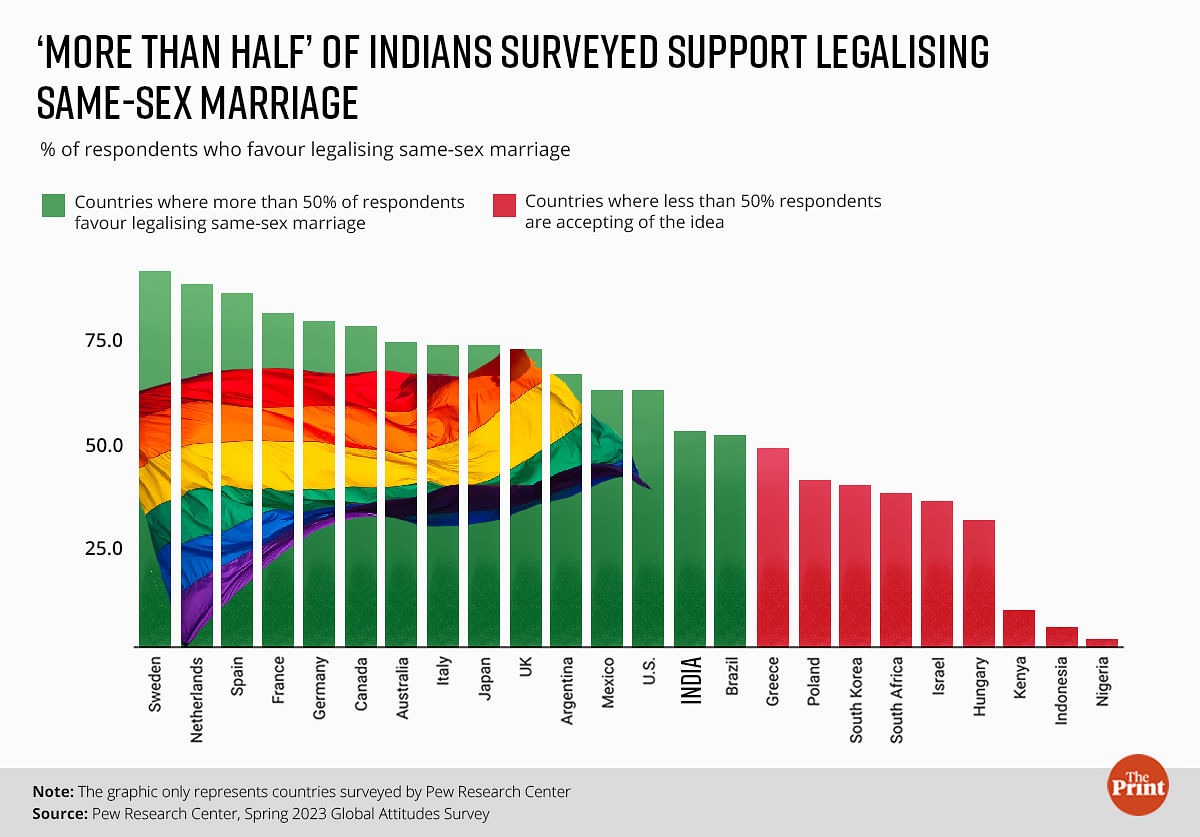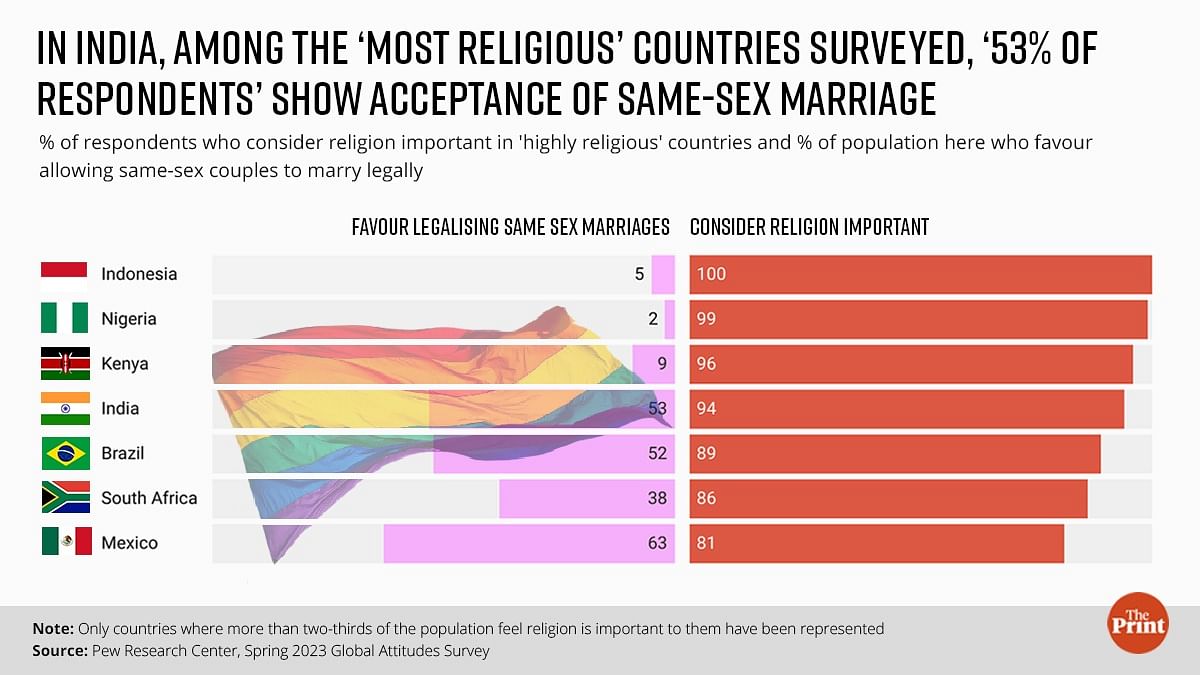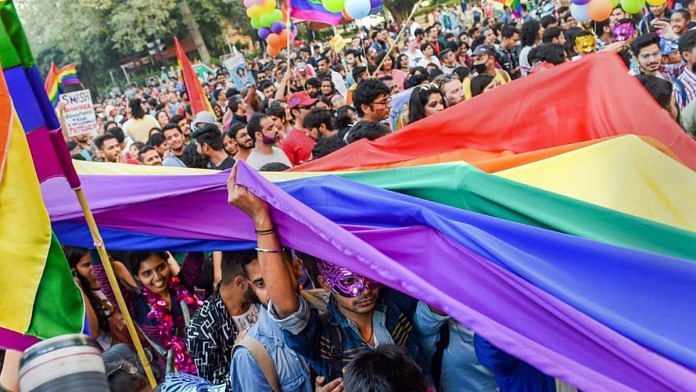New Delhi: While the Narendra Modi-led government at the Centre has been opposing petitions filed in Supreme Court seeking direction to the government to allow registration of same-sex marriages, findings of the Washington-based think tank Pew Research Center would suggest that a significant section of the population in India may not be opposed to the idea.
The Modi government had opposed the petitions on grounds that the “Indian notion of marriage”, “necessarily and inevitably presupposes a union” between a biological man and a biological woman only. It had also dismissed the petitions as something that “reflect urban elitist views for the purpose of social acceptance” — a claim rejected by the Supreme Court as assertion not backed by data.
Now, a survey by the Pew Research Center — Spring 2023 Global Attitudes Survey — the results of which were released Tuesday, has found that nearly 53% of Indians surveyed are accepting of legalising same-sex marriages.
India is also among top three countries surveyed, when it comes to percentage of the population surveyed which supports legalising same-sex marriage despite being in the “most religious countries” category. In general, countries where a higher percentage of respondents said religion was important to them, showed lower acceptance of legalising same-sex marriage.
In an affidavit submitted in Supreme Court in March, the Union government had argued that the institution of marriage has a sanctity attached to it, and in major parts of India, is regarded as a “sacrament, a holy union, and a sanskar” and this relationship essentially between a man and woman is “socially, culturally and legally ingrained”.
It had further argued that the court, therefore, ought not to disturb or dilute the concept of marriage by judicial interpretation, as it would change the entire legislative policy that is “deeply embedded in religious and societal norms”.
The Supreme Court last month reserved its verdict on the petitions for legalising same-sex marriages in India.
The Spring 2023 Global Attitudes Survey was conducted among 3,500 American and over 27,000 non-US residents in March this year.
In 15 of the 24 countries surveyed, a majority of the respondents — at least 51 per cent — supported legalising same-sex marriages.
Also read: Allowing same-sex marriage will bring down the divorce rates of ‘straight’ marriages
How India compares to other countries
The survey findings indicate the highest levels of acceptance of legalising same-sex marriage come from “Western European countries”, with a few nations like Canada, India, Brazil, Argentina, Mexico, Australia, and Japan — where more than 50 per cent of respondents showed acceptance of legalising such unions — being an exception to this.
In Sweden, 94 per cent of respondents supported legalising same-sex marriages, while the figure was 89 per cent in the Netherlands, 87 per cent in Spain, 82 per cent in France, and 80 per cent in Germany.
In Canada, about 79 per cent of the population supported legalising same-sex marriages, followed by 75 per cent in Australia and 74 per cent each in Italy and Japan. (See graphic below for more)

In India, 28 per cent of respondents “strongly favoured” legalising same-sex marriages while 25 per cent “supported it somewhat”, which brought the total tally of those in favour of legalising same-sex marriages in the country to 53 per cent. However, the percentage of those opposed to the idea is India was also not insignificant — 31 per cent of the respondents “strongly opposed” any policy change to that effect.
Only 12 per cent of Indian respondents said they somewhat opposed to legalising same-sex marriage, bringing the total negative response to about 43 per cent. About 4 per cent of respondents did not answer the question.
Religion and same-sex marriages
Another point that the Pew Research Center survey highlights is that in most cases, acceptance of legalising same-sex marriages is strongly linked to the level of religiosity in a country.
Respondents were asked how important religion was to them — with the options “very important” and “somewhat important” being counted as that in favour of being religious — to gauge the level of religiosity of a country.
According to the survey, in most cases, high religiosity was found to be inversely proportional to acceptance of legalising same-sex marriages.

What this means is that as religiosity levels go up, acceptance towards legalising same-sex marriages go down. The survey mentions that the coefficient of correlation — which quantifies the strength of this — was -0.74, which means that in 74 per cent of the countries surveyed, there was a negative relationship between religiosity and acceptance of legalising same-sex marriage.
India was among the countries where this did not hold true. Despite high religiosity, India exhibited a relatively higher acceptance towards legalising such marriages.
According to the survey, 94 per cent of Indians surveyed considered religion to be important to them. Despite this, 53 per cent were in favour of legalising same-sex marriages.
In Indonesia, where 100 per cent of respondents said they considered religion important, barely 5 per cent voiced support of legalising same-sex marriages. Similarly, in Nigeria, with 99 per cent religiosity, only 2 per cent were accepting of legalising same-sex marriages.
In South Africa, where 86 per cent respondents said religion was important to them, only 38 per cent showed acceptance towards legalising same-sex marriages.
Other exceptions to the religiosity vs acceptance of legalising same-sex marriages rule, include Brazil and Mexico. In Brazil, where 89 per cent of respondents said religion was important to them, 52 per cent voiced acceptance for the legalisation of same-sex marriage. In Mexico, the number was 63 per cent and 81 per cent, respectively.
(Edited by Poulomi Banerjee)



